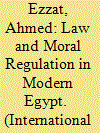| Srl | Item |
| 1 |
ID:
175800


|
|
|
|
|
| Summary/Abstract |
This article examines the historical roots of juridical moral regulation in modern Egypt, assessing the relationship between modern law and shariʿa through the lens of the influence of the Islamic practice of ḥisba on courts and legislators. The article engages critically with scholarship on Islamic law and postcolonial theory regarding the impact of Western colonialism on law in Muslim societies and problematizes the understanding that shariʿa was secularized in the Egyptian legal culture through the translation of Western legal concepts. Instead, a different narrative is offered, one that recognizes the agency of local actors in the process of secularization and considers the influence of shariʿa in the legal development of contemporary Egypt.
|
|
|
|
|
|
|
|
|
|
|
|
|
|
|
|
| 2 |
ID:
161396


|
|
|
|
|
| Summary/Abstract |
Beyond the esoteric deliberations of Islamic jurists and their exegesis of criminal and private law doctrines, Iranian law lives a life of its own. It is a life of routine practices of judges, court clerks, lawyers and clients, each of whom is striving to turn the law to their own advantage. It is also a life of contested legality, a relentless struggle over the right to determine the law in a juridical field which is infused with strife and hostility. These conflicts are reproduced daily as two competing conceptions of law, and their corresponding perceptions of legality clash in pursuit of justice. The Iranian judiciary’s concept of law, its reconstruction of Islamic jurisprudence and methods of dispensing justice, which on the surface are reminiscent of Max Weber’s “qādi-justice,” collide with the legal profession’s formal rational understanding thereof. However, Iranian judges are not Weberian qādis, and the legal profession is not a homogenous group of attorneys driven by a collective commitment to the rule of law. To understand their conflict, we need to explore the mundane workings of the legal system in the context of the transformation of Iranian society and the unresolved disputes over the direction of its modernity.
|
|
|
|
|
|
|
|
|
|
|
|
|
|
|
|